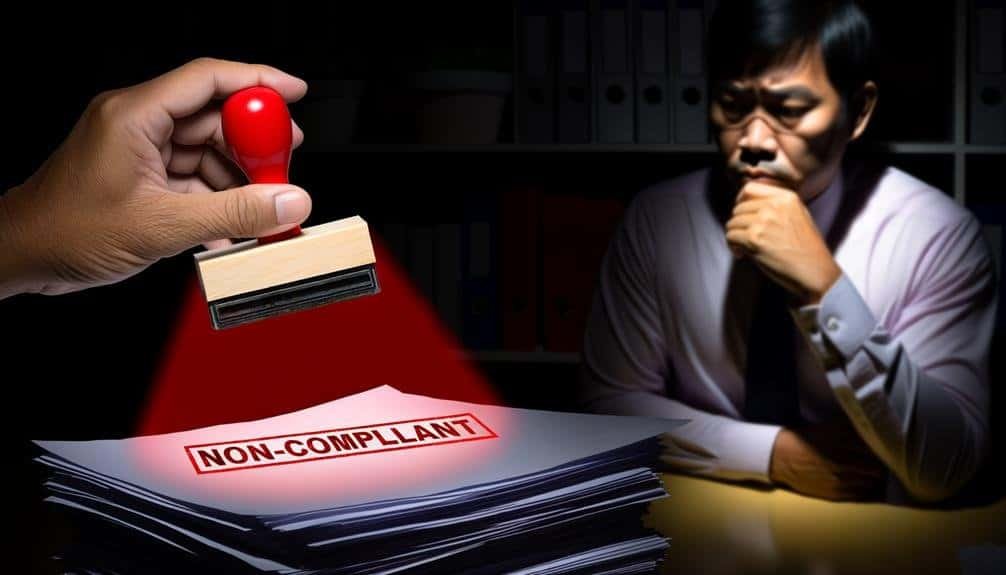What Is a Notice of Non-Compliance?
Have you ever received a notice of non-compliance? Maybe it came as a surprise or left you wondering what it actually means. Well, let's clear the air and dive into the world of non-compliance notices.
In this discussion, we will explore the definition of non-compliance, the different types of notices, the reasons behind receiving one, the potential consequences, and the steps you can take to address it.
So, buckle up and get ready to unravel the mystery surrounding notices of non-compliance.
Key Takeaways
- Non-compliance refers to the failure to meet specified requirements, regulations, or standards and can have serious consequences such as penalties, fines, legal action, or loss of privileges.
- There are different types of non-compliance notices, including warning notices, corrective action notices, and enforcement notices, each with its own implications and requirements for resolution.
- Notices of non-compliance can be received for various reasons, such as failing to meet regulatory requirements, violating safety protocols, or not following proper documentation procedures.
- It is crucial to take notice of non-compliance seriously, promptly acknowledge the notice, investigate the violation, develop an action plan, implement necessary measures, address underlying issues, and maintain open communication with the issuing authority.
Definition of Non-Compliance
Non-compliance refers to the failure to adhere to or meet the specified requirements, regulations, or standards. When an individual or organization doesn't comply with these guidelines, there are consequences that can arise. These consequences may include penalties, fines, legal action, or loss of privileges.
Non-compliance can also have broader implications, such as damage to reputation or loss of trust from stakeholders. Resolving non-compliance requires taking immediate action to rectify the situation and prevent further violations. This may involve implementing corrective measures, conducting investigations, or seeking guidance from regulatory bodies.
It's important to address non-compliance promptly and effectively to ensure compliance with regulations and to maintain trust and credibility within the industry or community.
Types of Non-Compliance Notices
After understanding the definition of non-compliance and its consequences, it's important to familiarize yourself with the different types of notices that can be issued in response to non-compliance.
There are several types of non-compliance notices that can be issued, depending on the severity and nature of the violation. The most common types include warning notices, corrective action notices, and enforcement notices.
Warning notices are typically issued for minor infractions and serve as a reminder to rectify the non-compliance.
Corrective action notices require the recipient to take immediate action to address the violation and prevent further non-compliance.
Enforcement notices are issued when repeated non-compliance occurs, and they often involve penalties or legal action.
It's crucial to understand the consequences of each type of notice and take appropriate action to remedy the non-compliance.
Reasons for Receiving a Notice of Non-Compliance
There are various reasons why you may receive a notice of non-compliance. Common mistakes that can lead to receiving such a notice include failing to meet regulatory requirements, violating safety protocols, or not following proper documentation procedures.
These mistakes can have serious legal implications for your business or organization. Non-compliance notices are typically issued by regulatory authorities or governing bodies to ensure adherence to laws, regulations, and standards. They serve as a warning and an opportunity to rectify the non-compliant behavior.
Failure to address the issues outlined in the notice can result in penalties, fines, or even legal action. It's important to take these notices seriously and promptly address any issues to avoid further consequences.
Consequences of Non-Compliance
Failing to address the issues outlined in the notice promptly can result in potential penalties, fines, or even legal action. Non-compliance with regulations or standards can have serious consequences for individuals or organizations.
The exact penalties and fines will vary depending on the nature and severity of the non-compliance, as well as the jurisdiction in which it occurred. In some cases, the penalties may be monetary, with fines imposed based on the extent of the violation. In other cases, legal action may be taken, leading to further legal implications and potential damage to one's reputation.
It's crucial to take notice of non-compliance seriously and take immediate action to rectify the situation to avoid these potential consequences.
Steps to Address a Notice of Non-Compliance
To effectively address a Notice of Non-Compliance, take immediate action to rectify the situation and prevent further consequences. Here are steps you can take to address non-compliance and resolve violations:
- Acknowledge the notice: Take the notice seriously and acknowledge its receipt promptly.
- Investigate the issue: Understand the nature of the violation and gather all relevant information.
- Develop an action plan: Create a detailed plan outlining the steps you'll take to rectify the non-compliance.
- Rectify the situation: Implement the necessary measures to resolve the violation promptly and effectively.
- Prevent future violations: Identify and address any underlying issues to prevent similar non-compliance in the future.
- Communicate with authorities: Maintain open and transparent communication with the issuing authority throughout the process to demonstrate your commitment to resolving the issue.
Conclusion
So, when it comes to a Notice of Non-Compliance, remember that it's a serious situation that shouldn't be taken lightly. Ignoring it can lead to severe consequences.
Instead, address it promptly and professionally to avoid further issues. Take the necessary steps to rectify the situation and ensure future compliance. Remember, timely action and attention are key to avoiding any complications.





